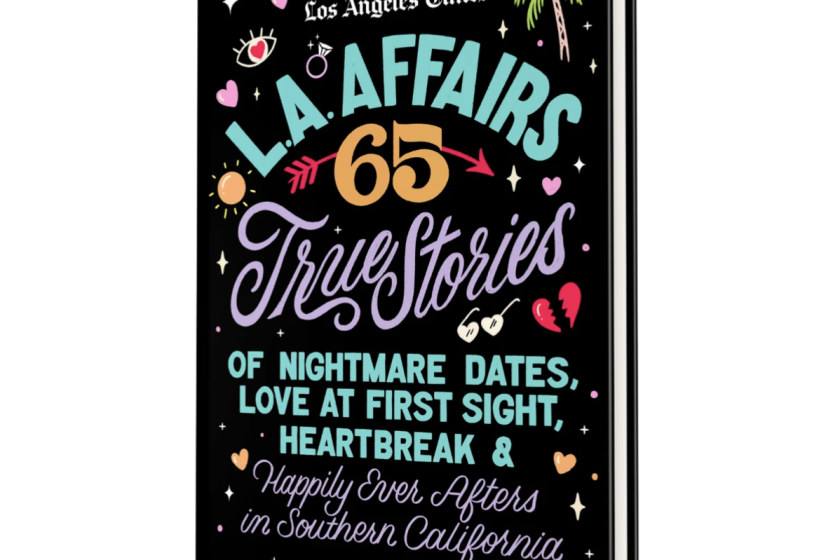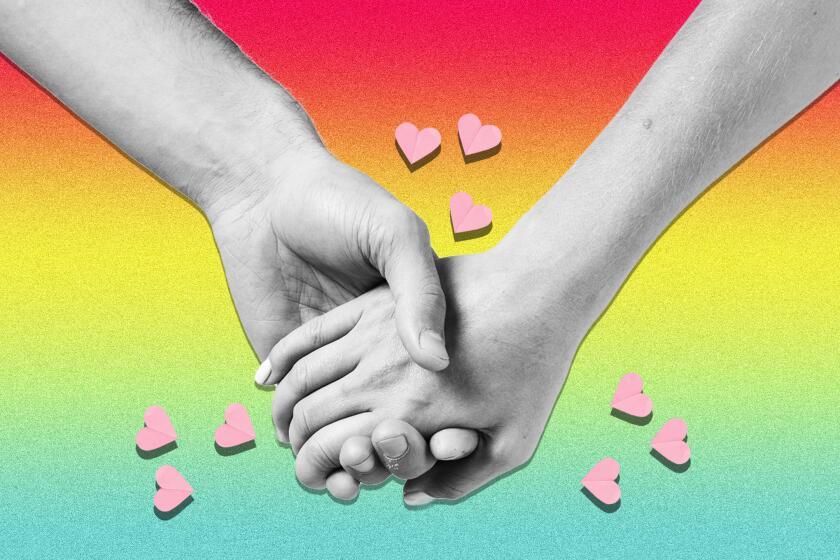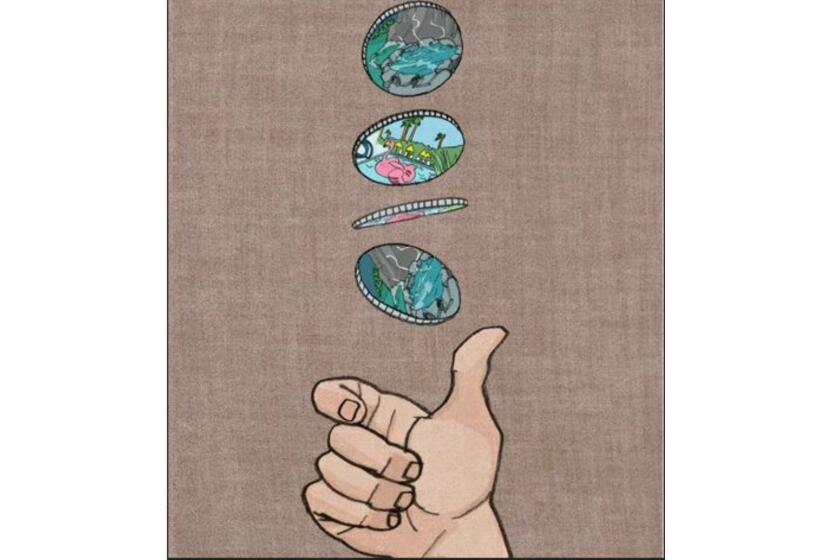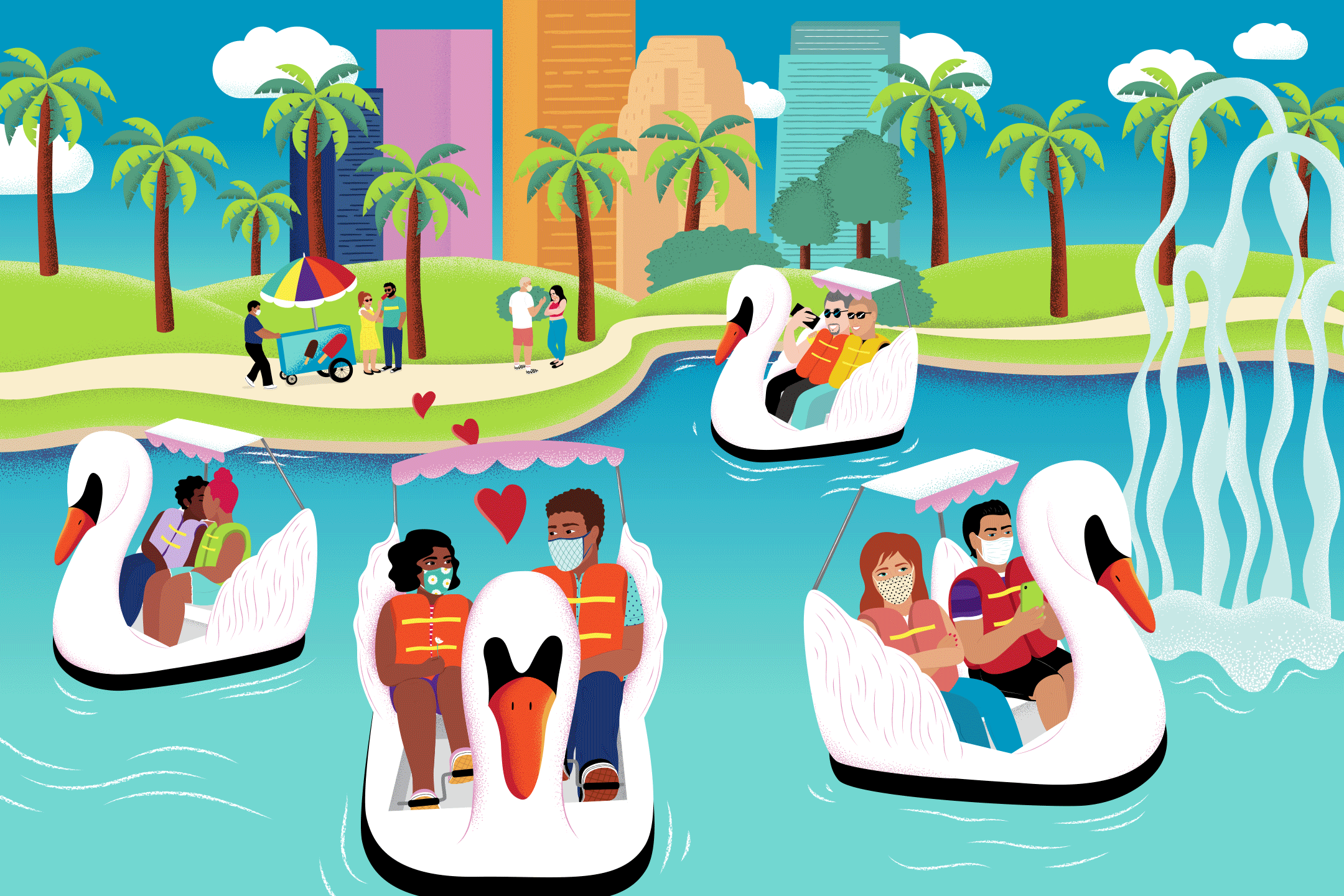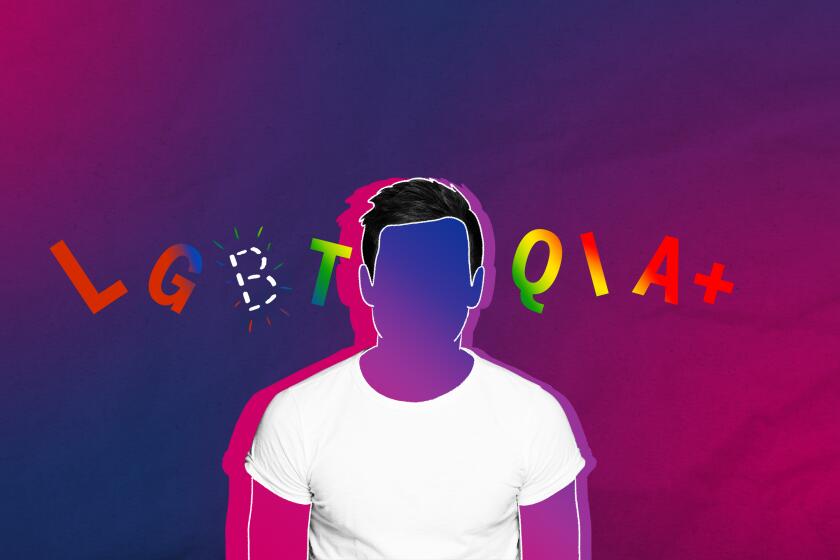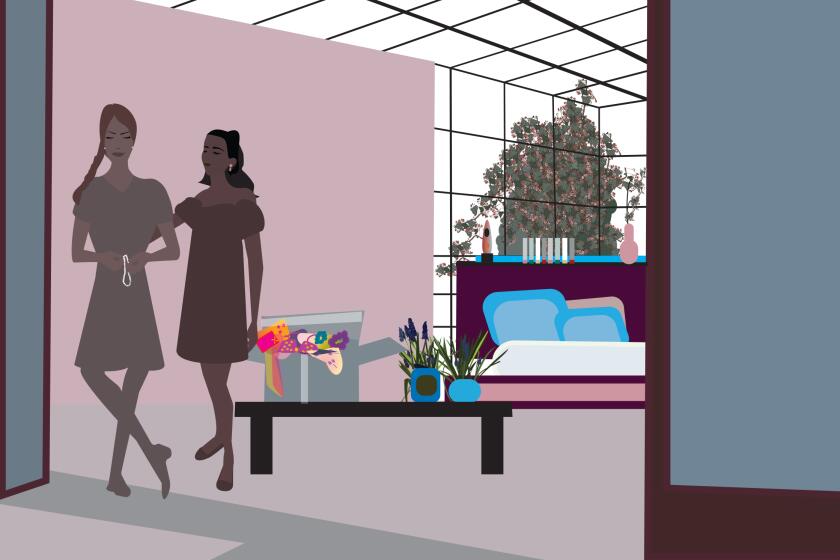L.A. Affairs: I’m queer. I’m a military veteran. So where do I belong?
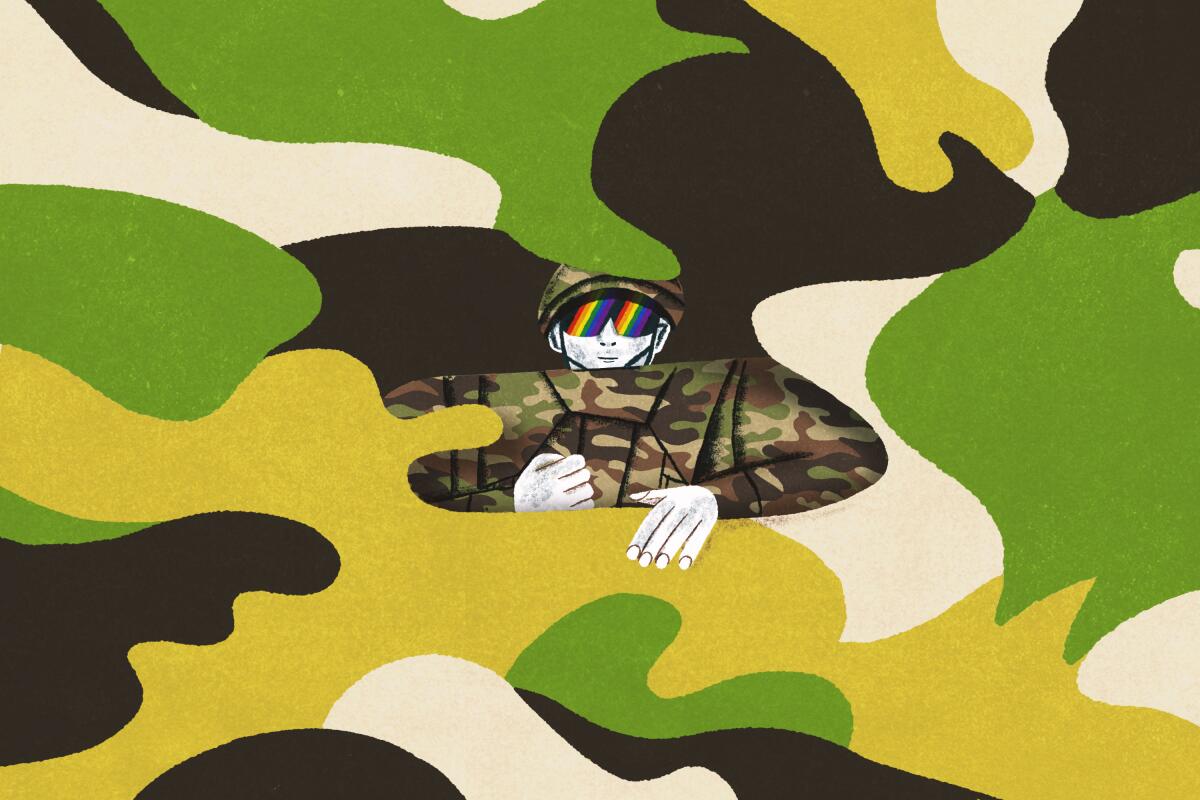
- Share via
I’d caught the eye of a guy dancing nearby just when my hands started to shake. As my body vibrated with the bass from the floor-to-ceiling speakers, pangs of dread rose in my chest. Each beat felt like a sickening bang.
It was the end of 2019. The party —a queer rave in a downtown L.A. warehouse — surged around me, an ocean of flashing lights and moving bodies. But I was on my own, drowning in the music’s rhythm, a near exact sensory match as the pulse from an improvised explosive device.
I felt a cold sensation on my leg; I’d crushed my Solo cup and spilled my drink. My heart was racing. I was crying. And I was definitively out of luck with that guy who was, unfortunately, still staring at me.
Featuring our favorite tales of searching for love in Southern California, curated from the beloved L.A. Affairs column.
It had been two years since I’d ventured onto a queer dance floor. And it had been a year since my last off-base mission in Afghanistan, time I spent struggling to navigate gay Los Angeles, caught between two seemingly incompatible identities — queer and military. Both are important to me. Embodying both has felt impossible at times.
Just a few days earlier, I had been at a backyard party in Echo Park, sitting around a fire pit, talking. A guy in his 30s, about my age, asked: So what’s it like “coming out after the military?”
“I came out in college,” way before joining, I said.
“In that case, we don’t want you,” he responded. The unmistakable implication: After living an open, gay life, joining an institution with a long history of discrimination toward queer people represented a betrayal, a rejection of both my own queerness and core queer values. If I’d rejected that part of my identity, as he believed, the queer community should reject me in turn.
In honor of LGBTQ+ relationships in Los Angeles, here’s a roundup of our favorite L.A. Affairs columns.
It didn’t seem to matter that I hadn’t shied away from my gay identity while in the military. Nor did it matter that I had volunteered to spend a year in Afghanistan to fight for the same values that many in the queer community hold dear — minority rights, gender equality, freedom of expression. I tried to laugh it off. I excused myself from the fire pit a few minutes later and headed home.
As I stepped onto the dance floor a few days later, I wondered, “How many of these people don’t want me here?”
This fear of being cast out was familiar from a time past, from being closeted and coming out, terrified that there was an intrinsic part of me that people would never accept. And while I had found effective ways to cope with that trauma for the better part of a decade, the underlying psychological injury was present throughout — hidden until Afghanistan and reemerging on that dance floor, having become inextricably linked with my military experience.
It was a figurative flip of a coin: My friend Rick and I were deciding on where to go for a weekend away.
As it happened, my ability to effectively cope with that unprocessed queer trauma started to fray when I was faced with the additional stress of deployment. It felt like my body was starting to revolt as I labored to bring my queer and military identities together.
The first time I had a physiological response like the one I experienced on the dance floor I was at a dinner in the remote western reaches of Afghanistan.
I was at Camp Arena, the Italian-controlled NATO base in Herat province, eating dinner with three others from a group advising Afghan Special Operations. We were digging into some hot pizza. We’d flown in from Kabul earlier that day to meet with the U.S. Army Special Forces team stationed there. Because of recent fighting nearby, we needed them to escort us on our convoy the following morning. I had already completed several missions to visit Afghan Special Operations battalions across the country, but this was the first time I needed help from our own special forces to make the trip. I was anxious about it.
We collected some of our favorite L.A. Affairs columns — which run weekly in the Los Angeles Times, and chronicle the ups and downs of dating in Los Angeles and the search for love — into a new book. Here’s a sneak peek at a few of the columns you’ll find inside. Hint: The book would make a fab V-Day gift!
At dinner, conversation turned to the previous administration’s ban on transgender troops, then to the reality of gay men and women serving openly. I had come out to two of these guys months earlier and was thankful they made it a non-issue.
But the fourth guy at the table, a major from the National Guard, someone I’d only just met, said he was glad there wouldn’t be any gays on the morning’s convoy. “We really need guys we can count on for this one.”
My pulse quickened. I started sweating. Fragmentary images flashed in my mind — scenes from college, being punched and kicked and taunted for being gay. I was still hungry and staring at the last slice of pizza, but I kept my hands under the table so nobody would see them shaking. I said nothing.
I am the invisible “B” in LGBTQIA+ — and I deserve to be seen. “Bierasure” is one of the lesser known issues that plague the LGBTQIA+ community. It’s the tendency to ignore and falsify evidence of bisexuality and its existence, and it leads to painful reactions when someone comes out as bisexual.
We completed our mission the next day with no issues. Gay as I am, it turns out I’m also pretty competent. As the four of us waited by the dusty tarmac for our flight back to Kabul, tired and bored, I thought we’d run out of conversation when the new major spoke up again. “You got a girlfriend back home?”
This was my moment.
“I was dating a guy, but we broke up when I got my deployment orders.”
“Man, that sucks. Happens a lot, though.” It sure does, but wait. What?
When he said he didn’t want any gays on our convoy, who exactly did he mean? Shouldn’t he be bothered by the gay man in front of him, the guy he’d just sat next to riding through contested Afghan territory?
A therapist explained that violent traumas can make all your inner emotions flare. All your conflicts, even those years old and long buried. And so I confessed it all. All my struggles. And this time, with the therapist’s help, I recognized that I was a woman.
In the day since he’d made that comment at dinner, he’d apparently come to his own conclusion about me — one that seemed to contradict his beliefs about the abilities of gay service members. I’d proven to him that I could be both a capable naval officer and authentically gay at the same time. More important, I’d proven it to myself.
I’ve drawn strength from that episode in Herat as I face similar challenges at home — managing my overworked fear response such as at the club that night, integrating my queer and veteran identities, cultivating meaningful connections with my peers and therapy for PTSD. If I could come out in the military, I could “come out” to my gay peers too.
I ended up at Akbar in Silver Lake a few Saturday nights back, the first time since the COVID restrictions started. It was smaller than that pre-pandemic rave but still joyful, queer, crowded and loud. I was with friends. Many of them knew why I joined the military and what my experience was, because I’d shared with them during quieter quarantine conversations. My hands trembled at moments when a beat-heavy song came on, but this time I found myself able to put my mind at ease. My queer and veteran identities are starting to comfortably coexist.
The author is a U.S. Navy veteran who deployed in a joint Army and NATO billet, now living in Echo Park. He is @charlierobs on Instagram.
L.A. Affairs chronicles the search for romantic love in all its glorious expressions in the L.A. area, and we want to hear your true story. We pay $300 for a published essay. Email LAAffairs@latimes.com. You can find submission guidelines here.
More to Read
Sign up for The Wild
We’ll help you find the best places to hike, bike and run, as well as the perfect silent spots for meditation and yoga.
You may occasionally receive promotional content from the Los Angeles Times.
